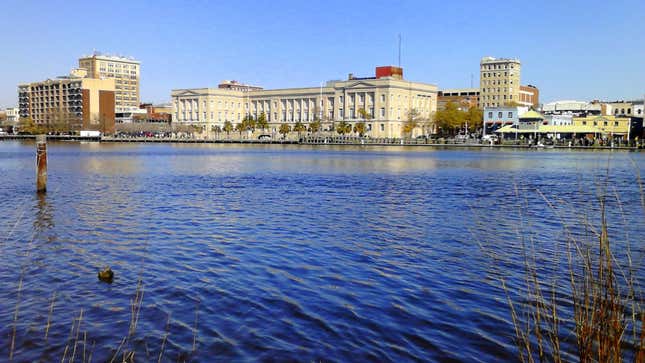
Donald Trump ratcheted up his veiled threats of a looming civil war on Tuesday night, tweeting that an upcoming impeachment inquiry was akin to a “coup.”
The claim is ludicrous on its face, but given the nature of Trump and his supporters’ feedback loop, many outlets felt forced to give the dictionary definition of what a coup d’état is (“the violent overthrow or alteration of an existing government by a small group,” according to Merriam Webster) and why impeachment doesn’t apply (it’s a process written into the Constitution, assholes).
But even though Americans tend to think of coups as a sort of devastating news item that typically concerns some so-called “Third World” democracy, it’s worth noting that the U.S. is no stranger to coups. We’ve had one, and its circumstance—along with its relative obscurity as a historical fact—tell us a lot about this country.
The only coup to take place on U.S. soil happened in the post-Reconstruction South, on November 10, 1898, when a mob of 400 white supremacists in Wilmington, N.C., overthrew a democratically elected government comprising black Republicans and white populists, burning black businesses to the ground, murdering as many as 60 people and expelling many hundreds more. While the details resemble that of other horrific examples of mass racial violence—the 1921 Tulsa Massacre being among them—the mob attack in Wilmington stands alone because it’s the only case where a government was toppled.
I went to college in Wilmington, and stumbled on the history thanks in large part to local activists I had befriended and my professors; they noted that the event, which fundamentally reshaped the city from a majority-black port city to one that remains majority white, wasn’t even taught in Wilmington’s schools. Streets and buildings are named for the coup’s orchestrators and beneficiaries. One of the city’s major parks is still named for one of the orchestrators of the coup, Hugh McRae: the white supremacist-named park is a frequent host to cookouts, fundraisers, picnics, and student and alumni events for the University of North Carolina Wilmington.
The coup has been referred to as a massacre, an insurrection, and a race riot. As the Atlantic writes, for nearly 100 years, the white supremacists who seized power of the city “cast [themselves] as heroes in American history textbooks. The black victims were wrongly described as instigators.”
While the coup is a singular event in American history, its themes (white violence and lawlessness, unchecked and ultimately reinforced by state power) and its treatment (broad historical amnesia) repeat themselves over and over, like an infinity mirror reaching into the present. White violence—evidenced in, but not limited to, the rise of white supremacist domestic attacks—has largely evaded accountability or correction for much of the country’s history. And it is this strain of violence, demonstrated by modern-day pro-Trump militias, that Trump is invoking from his supporters when he tweets about coups and civil wars.
Trump, a racist con artist-turned-racist president, likely doesn’t know a thing about what happened in Wilmington in 1898, but as he’s shown multiple times throughout the course of his presidency, he doesn’t need to know this history to align with it.

